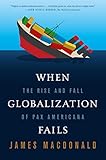When globalization fails : the rise and fall of Pax Americana / James MacDonald.
Material type: TextLanguage: Eng Publication details: New York : Farrar, Straus and Giroux, [2016]Description: 309 p. ; 23 cmISBN:
TextLanguage: Eng Publication details: New York : Farrar, Straus and Giroux, [2016]Description: 309 p. ; 23 cmISBN: - 9780374535971 (paperback)
- 0374535973 (paperback)
- International economic relations -- History -- 20th century
- Relaciones económicas internacionales -- Historia -- Siglo XX
- Balance of power
- Balance de poder
- World politics
- Politica mundial
- Economía internacional
- United States -- Foreign economic relations
- United States -- Foreign relations
- Estados Unidos -- Relaciones económicas exteriores
- Estados Unidos -- Integración económica
- 337.73
- HF 1359 M135w 2016
| Item type | Current library | Home library | Collection | Shelving location | Call number | Copy number | Status | Date due | Barcode |
|---|---|---|---|---|---|---|---|---|---|
 Libro
Libro
|
Biblioteca Juan Bosch | Biblioteca Juan Bosch | Ciencias Sociales | Ciencias Sociales (3er. Piso) | HF 1359 M135w 2016 (Browse shelf(Opens below)) | 1 | Available | 00000128707 |
Includes bibliographical references and index.
Introduction -- 1. The First Era of Globalization -- 2. Economic Warfare, 1914-1918 -- 3. The Failure of Economic Isolationism -- 4. Economic Warfare, 1939-1945 -- 5. Pax Americana and the Second Era of Globalization -- 6. The End of Pax Americana? -- Notes -- Bibliography -- Acknowledgments -- Index
Is globalization an unintended recipe for war? Taking this question as its starting point, former investment banker James Macdonald offers a rich, original account of war, peace, and trade in the 20th century--and a cautionary tale for the 21st. In the late 19th century, liberals exulted that the spread of international commerce would usher in prosperity and peace. An era of economic interdependence, they believed, would render wars too costly to wage. But these dreams were dashed by the carnage of 1914-1918. Seeking the safety of economic self-sufficiency, nations turned first to protectionism and then to territorial expansion in the 1930s--leading again to devastating conflict. Following the Second World War, the globalists tried once more. With the communist bloc disconnected from the global economy, a new international order was created, buttressing free trade with the informal supremacy of the United States. But this benign period is coming to an end. According to Macdonald, the global commerce in goods is a mixed blessing. It makes nations wealthier, but also more vulnerable. And while economic interdependence pushes toward cooperation, the resulting sense of economic insecurity pulls in the opposite direction--toward repeated conflict. Expertly blending political and economic history and enlivened by vivid quotation,When Globalization Fails recasts what we know about the past and raises vital questions about the future


There are no comments on this title.